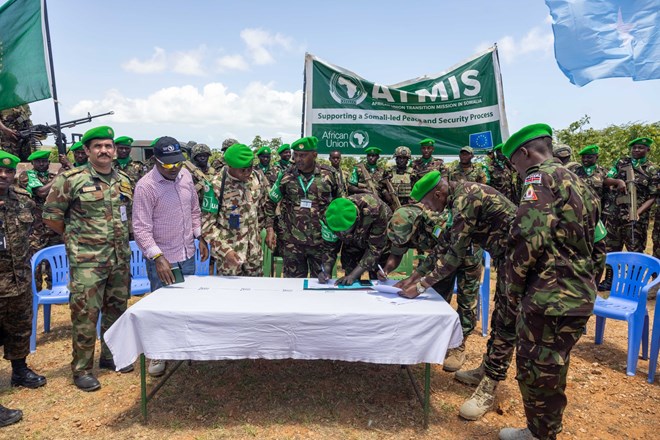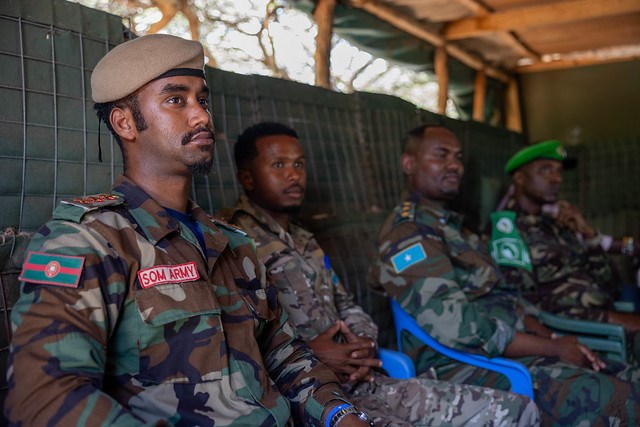
Friday October 18, 2024

Somali military officials and Kenya Defense Forces personnel under the African Union Transition Mission in Somalia (ATMIS) sign the official handover documents for the Kuday Forward Operating Base on Wednesday. The handover is part of the ongoing drawdown of ATMIS troops, marking a significant step in Somalia's journey toward full security responsibility. CREDIT/ ATMIS
Mogadishu (HOL) —The African Union Transition Mission in Somalia (ATMIS) officially transferred control of the Kuday Forward Operating Base (FOB) to Somali forces on Wednesday, a major step in the third phase of ATMIS’s troop drawdown and Somalia’s increasing self-reliance in security.
Kuday, located near the strategic port city of Kismayo, has been operated by the Kenya Defense Forces (KDF) since 2015 under ATMIS. The base is a critical buffer zone, protecting the port and surrounding areas from militant attacks. With ATMIS set to fully withdraw from Somalia by the end of 2024, the handover signals Somalia’s growing capacity to take charge of its own security, even as challenges remain.
“This handover demonstrates Somalia’s capacity and commitment to assume full control of its security, with the continued support of ATMIS,” said Col. Suleiman Ibrahim, ATMIS Military Chief Engineer. He praised the outgoing KDF forces for their role in stabilizing the region and urged Somali forces to continue the work of their predecessors.
The handover includes transferring UN-owned equipment, including generators and solar panels, to Somali forces.
The base’s liberation from Al-Shabaab in 2015 was a major victory for Somali forces, supported by ATMIS. Since then, Kuday has been pivotal in stabilizing southern Somalia, contributing to the economic revival of Kismayo, one of Somalia’s most important ports. However, Al-Shabaab remains a persistent threat, with the militant group continuing to launch attacks across the country.
While the Kuday handover is a positive step, the Somali Security Forces (SSF) face significant challenges as they prepare to assume full responsibility for security across the country. Slow progress in force generation within the SSF and a lack of key capabilities, such as air support for remote regions, continue to hamper operations. Experts have warned that if these issues are not addressed, the gains made in recent years could be at risk.
Brigadier Rashid Seif, ATMIS Sector Two Commander, presided over the ceremony, stressing the importance of this transition for both ATMIS and the Somali government. “We have engaged in extensive discussions and planning for this exit. We are confident that Somali forces will maintain the security of this strategic region,” he said.

Somali National Army officers attending the handover ceremony of the Kuday Forward Operating Base, as the African Union Transition Mission in Somalia (ATMIS) transfers control to Somali forces. The event marks a critical phase in Somalia's security transition.
Incoming FOB commander Maj. Hud Tohwari expressed optimism about the base’s continued role in safeguarding the region. “We will continue working with allied forces to ensure security and stability in Lower Juba,” said Maj. Tohwari signed the official handover documents alongside representatives from ATMIS and the UN Support Office in Somalia (UNSOS).
ATMIS, which evolved from the African Union Mission in Somalia (AMISOM) in 2022, has already withdrawn 2,000 troops in the third phase of its drawdown, with additional bases handed over earlier, including Barire, El Eglow, and Jowhar.
Looking ahead, Somalia’s security will be supported by a new mission—the African Union Support and Stabilization Mission in Somalia (AUSSOM)—beginning in January 2025. AUSSOM will take over from ATMIS, though with fewer resources and a smaller force footprint. The success of this new mission will depend heavily on international support, particularly in addressing gaps in Somalia’s military capabilities.
Funding will be critical to AUSSOM’s effectiveness. ATMIS has faced a significant financial shortfall, with a reported $150 million deficit since April 2022. International donors are currently discussing new funding mechanisms to ensure that the successor mission is adequately resourced. The United Nations Support Office in Somalia (UNSOS), which has been providing logistical support to ATMIS, is expected to continue playing a key role.
Despite the progress made in transitioning security to Somali forces, Al-Shabaab continues to pose a serious threat. The militant group frequently carries out attacks on both military and civilian targets, threatening the stability of the region. Maj. Sakariye Mohamed Omar of the Somali National Army emphasized the importance of regional cooperation in combating the group. “Al-Shabaab is not just a threat to Somalia—it poses a danger to Kenya, Ethiopia, and the entire region. We must work together to defeat this common enemy,” he said during the handover ceremony.